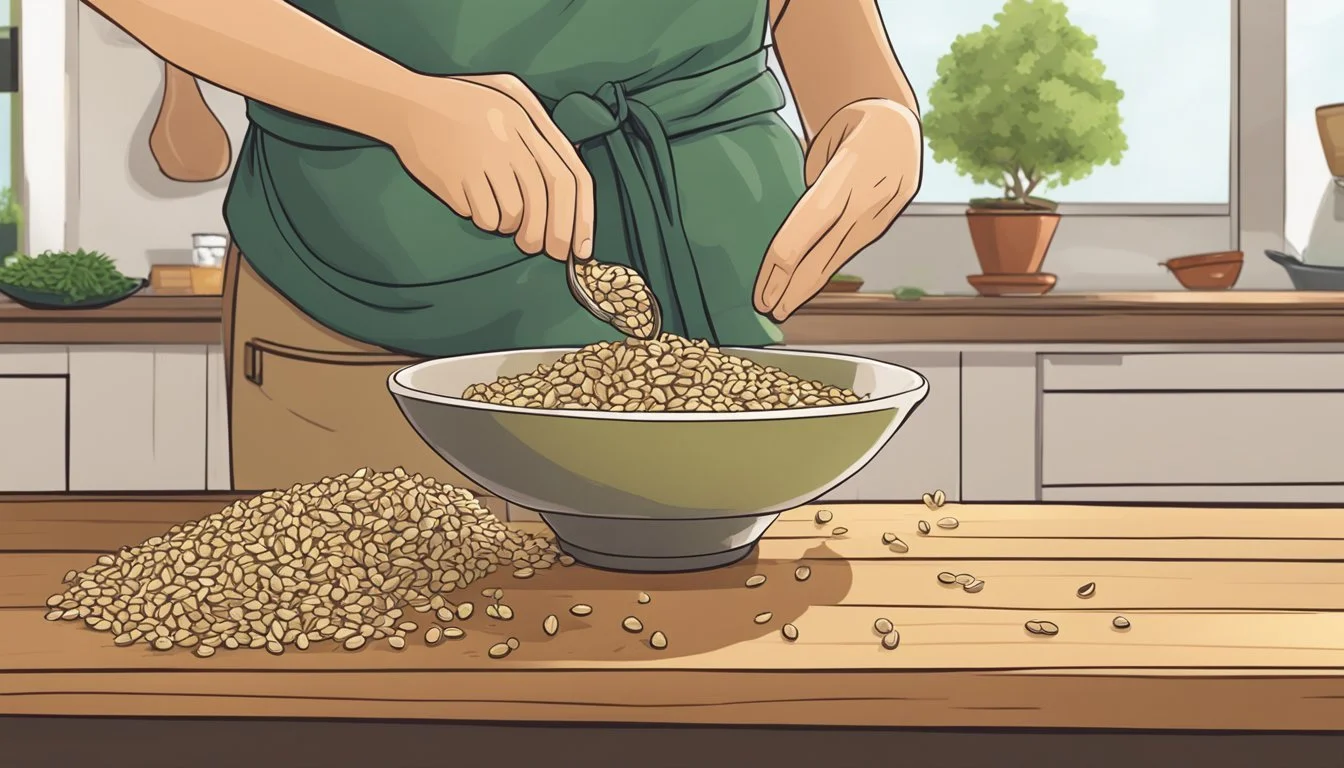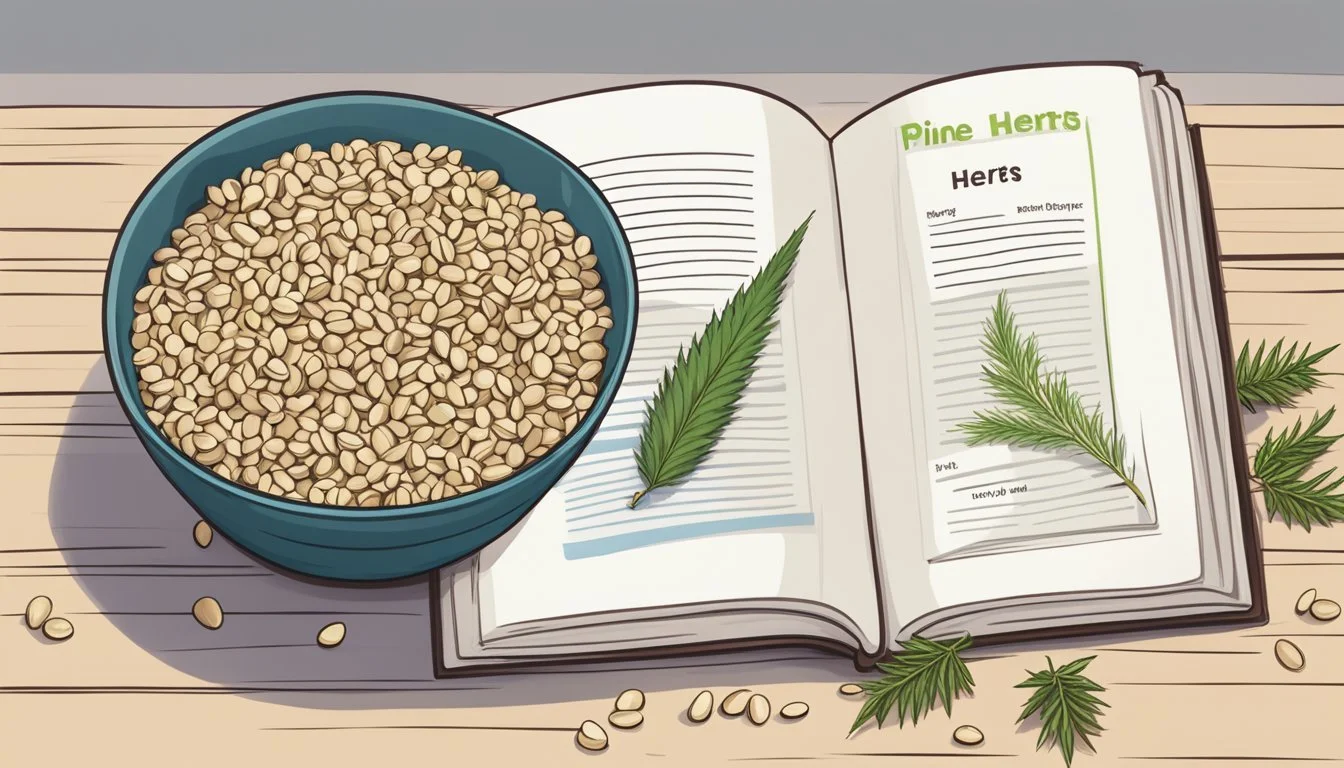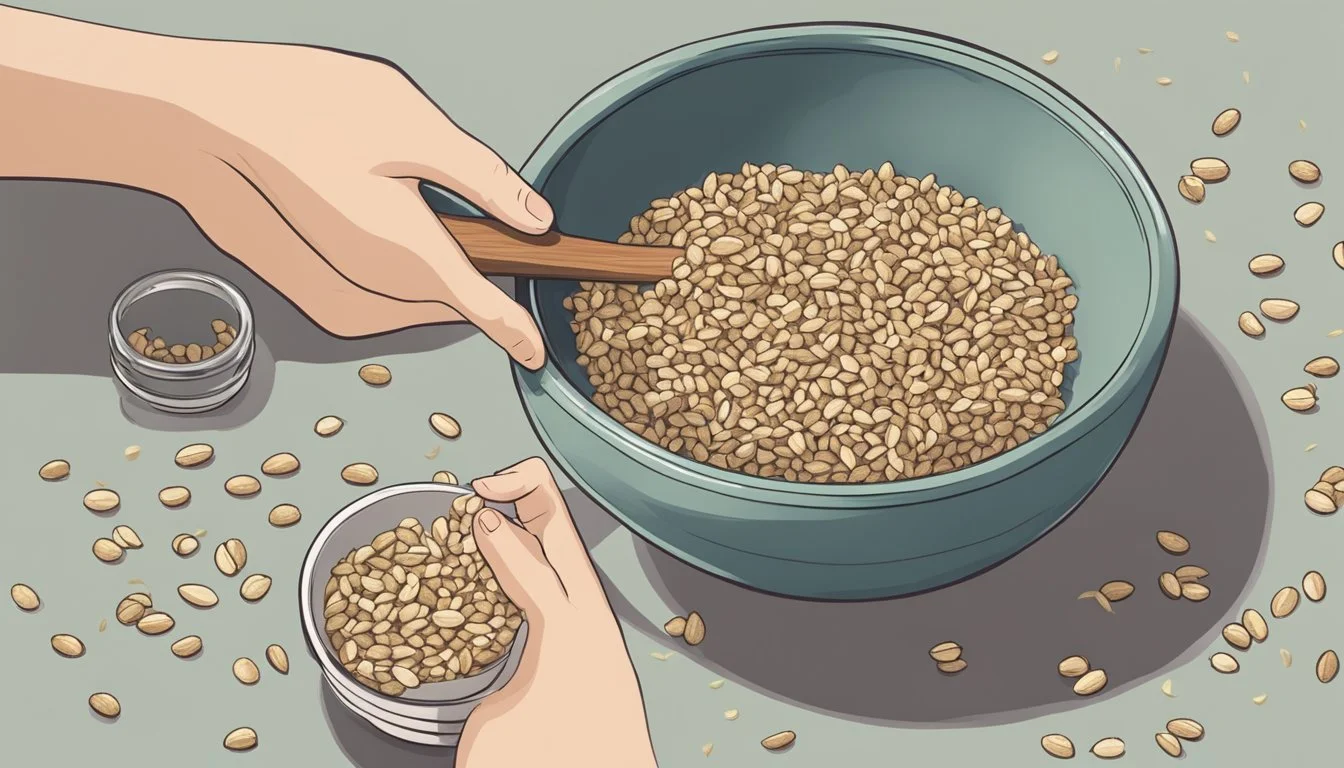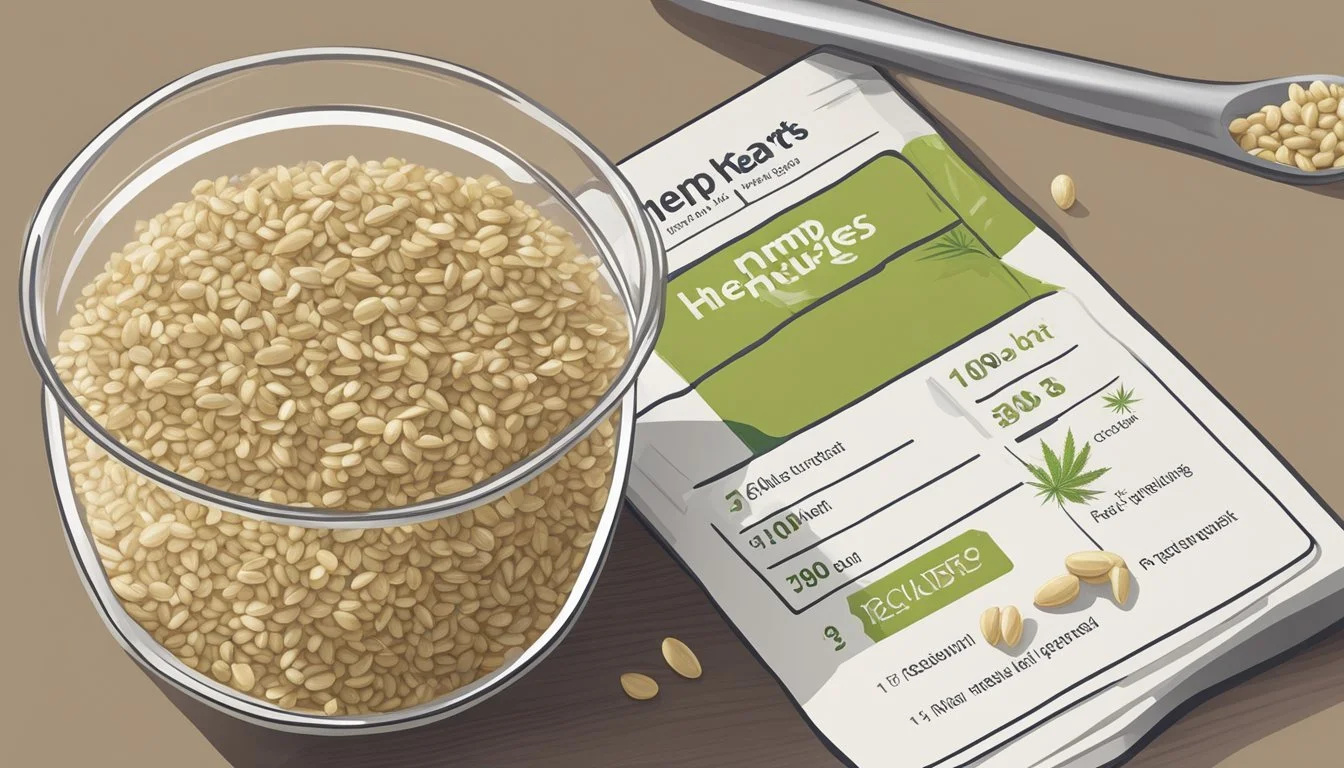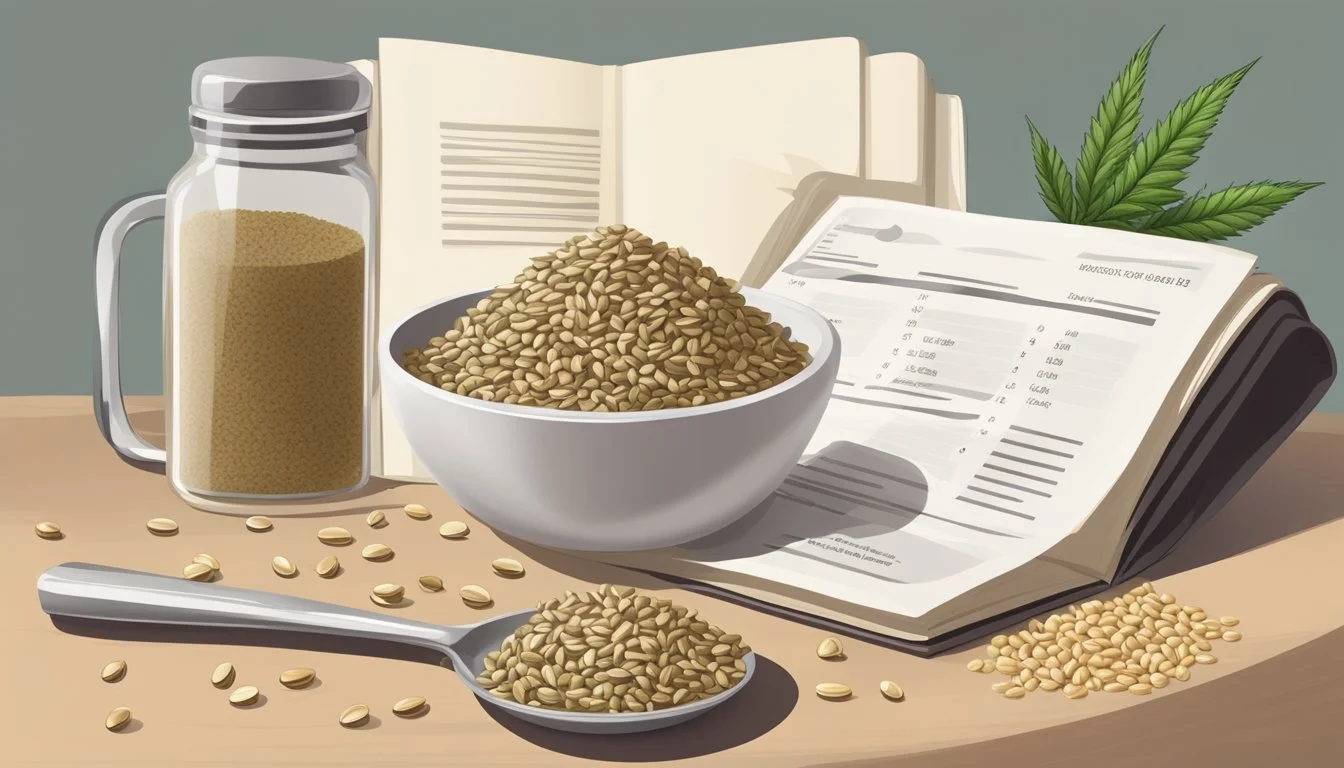How to Substitute Hemp Hearts for Pine Nuts
A Simple Guide
Hemp hearts, the tender core found within the shell of a hemp seed, have risen in popularity as a nutritious food item, offering a plant-based source of complete protein, omega-3 fatty acids, and a variety of minerals including vitamin E, potassium, magnesium, calcium, iron, and zinc. They impart a mild, nutty flavor that makes them a viable alternative to pine nuts in various culinary applications. Their versatility in the kitchen is what makes them particularly appealing for those looking to substitute traditional ingredients for more nutrient-dense options.
When replacing pine nuts with hemp hearts in recipes, it's essential to consider both the texture and flavor profile they bring to the dish. While pine nuts are known for their creamy texture and rich taste, hemp seeds offer a similar nuttiness with a slightly different texture. They can be an ideal swap in pestos, salads, and baked goods, providing not only comparable flavor but also additional health benefits without compromising the integrity of the recipe.
For those with nut allergies or dietary restrictions, hemp hearts serve as an excellent nut-free option that facilitates the enjoyment of meals typically containing pine nuts. By integrating hemp hearts into their diet, individuals are able to maintain the essence of the dishes they love, while embracing the wholesomeness and nutritional value that these small but mighty seeds contribute.
Understanding Hemp Hearts
Hemp hearts, the nutritious inner core of the seed from the Cannabis sativa plant, are esteemed for their health benefits and culinary versatility. They offer a rich nutritional profile and are a valuable plant-based ingredient in a variety of recipes.
Nutritional Profile
Hemp seeds, specifically the hulled version known as hemp hearts, are a dense source of nutrition. They contain a complete protein, providing all nine essential amino acids necessary for the human body's functions. A 30-gram serving of hemp hearts notably offers about 10 grams of plant-based protein, making them an excellent protein source for vegetarian and vegan diets.
The seed is also high in fiber, which is crucial for digestive health, and it is rich in healthy fats. These include omega-3 and omega-6 fatty acids, which are known to support heart health as well as brain health. The omega-6 to omega-3 ratio in hemp hearts is typically around 3:1, which is considered a favorable balance.
Hemp hearts are abundant in vitamin E, an antioxidant that helps protect the body's cells from damage. The mineral content is impressive as well, with significant amounts of magnesium, iron, calcium, and zinc, all of which have various benefits including bone health and immune function.
Nutrient Benefit Plant-based Protein Supports muscle repair and growth Fiber Aids in digestion Omega-3 Fatty Acids Promotes heart and brain health Omega-6 Fatty Acids Supports overall health Vitamin E Acts as an antioxidant Magnesium Vital for many body processes Iron Essential for blood health Calcium Important for bones and teeth
Culinary Uses
Hemp hearts can be utilized in a multitude of culinary applications, thanks to their mild, nutty flavor that easily complements various dishes. They have gained popularity as a substitute for pine nuts in pesto, providing a similar texture and taste profile. Due to their nutritional benefits and flavor, hemp hearts are also commonly sprinkled on salads, blended into smoothies, and added to yoghurt or oatmeal.
In baking, their nutty taste enriches breads, muffins, and other baked goods. Hemp hearts are also a suitable alternative for people with nut allergies, as they can simulate the texture and enrich the nutrient content of a dish without the allergen concerns. As a plant-based source of nutrients, they offer a way to increase the healthfulness of recipes across various diets.
Benefits of Hemp Hearts Over Pine Nuts
Hemp hearts are becoming a popular alternative to pine nuts due to their health benefits and economic value. They offer a plethora of nutritional advantages and are often more accessible and affordable than pine nuts.
Health Advantages
Hemp hearts are a powerhouse of nutrition, boasting a rich profile of healthy fats, including omega-3 and omega-6 fatty acids. These fats are instrumental in reducing inflammation and contributing to heart health. They are a complete protein, making them an excellent choice for those on a vegan diet. Hemp hearts are also a source of zinc, a mineral essential for immune function.
Gluten-Free: Ideal for those with gluten sensitivities, hemp hearts are naturally gluten-free, unlike some processed pine nuts.
Allergies: Hemp hearts present fewer allergy concerns compared to pine nuts, which are considered a common allergen.
Hemp hearts have a subtle, nutty flavor similar to pine nuts, ensuring they can be used in similar culinary applications without compromising taste.
Economic Considerations
Economically, hemp hearts are often more affordable than pine nuts, which can be quite expensive due to the labor-intensive process required to harvest them. The increasing availability of hemp hearts makes them a cost-effective substitute in various recipes, from salads to pesto.
Price Comparison: Hemp hearts generally cost less per ounce compared to pine nuts, offering budget-conscious consumers a viable alternative.
Yield: The hemp plant is typically more resilient and produces a greater yield per acre than pine trees, contributing to the reduced cost of hemp-based products.
Culinary Substitutions
When substituting hemp hearts for pine nuts, chefs aim for a similar texture and flavor profile. Despite a subtle taste difference, hemp hearts provide a nutrient-rich, nut-free alternative that seamlessly incorporates into various recipes.
Pesto Alternatives
In pesto recipes, pine nuts contribute to the creamy texture and nutty flavor. Hemp hearts are an excellent pine nut substitute, especially in nut-free pesto recipes. They blend well with extra virgin olive oil, garlic, and lemon juice, keeping the traditional pesto essence intact.
Proportion: Replace pine nuts with equal parts hemp hearts.
Flavor: To achieve a comparable flavor, ensure the hemp hearts are toasted lightly before blending.
Baking and Cooking
Hemp hearts can be used in baking and cooking as a functional alternative to pine nuts. They maintain their integrity under heat and offer a soft, chewy texture in baked goods.
For cookies or bread, incorporate hemp hearts just as you would pine nuts.
In savory dishes like stuffed vegetables or grain pilafs, the subtle nuttiness of hemp hearts complements the overall flavor profile.
Snacks and Salads
Hemp hearts sprinkle easily over salads and serve as a nutritious garnish. Compared to pine nuts, they offer a different flavor but a similarly pleasing crunch.
Mix hemp hearts into yogurt or smoothies for added texture.
Combine them with other seeds like pumpkin seeds, sunflower seeds, sesame seeds, chia seeds, or flax seeds for a diverse nutrient range.
Substitute Quantities and Ratios
When substituting hemp hearts for pine nuts, it's important to understand the quantities and ratios to achieve a comparable flavor and texture. The measures should be directly proportional, and the nutty taste characteristic of pine nuts can usually be effectively mimicked with hemp hearts.
Equivalents in Recipes
In most recipes, hemp hearts can be substituted for pine nuts on a one-to-one basis. This means if the recipe requires one cup of pine nuts, one should use one cup of hemp hearts as a replacement. Here is a simple equivalence table for quick reference:
Pine Nuts Hemp Hearts 1 tablespoon 1 tablespoon 1/4 cup 1/4 cup 1/2 cup 1/2 cup 1 cup 1 cup
It should be noted that hemp hearts lack the exact flavor profile of pine nuts, which is slightly more pronounced and buttery. Thus, while the measurement remains the same, the end result will have the distinct, mild nutty flavor that hemp seeds are known for.
Adjusting for Taste and Texture
Texture-wise, hemp hearts are softer than pine nuts, which may result in a less crunchy element in the dish. Those who enjoy the crunch of pine nuts might consider toasting the hemp hearts before use, which can enhance their texture and bring out a nuttier flavor.
For taste adjustments, one might consider adding a pinch of salt when using hemp hearts as they do not have the same natural saltiness as pine nuts. When the richness of pine nuts is desired, blending in small amounts of other nuts such as cashews or macadamia nuts can help enrich the flavor profile. If a recipe demands the creamy quality pine nuts offer, especially in sauces like pesto, the introduction of a small portion of white beans may enhance the creaminess. Here are some additional nuts that one might incorporate to achieve a desired outcome:
For increased richness: blend in a small amount of cashews or macadamia nuts.
To maintain a nut-free dish: use coconut or seeds such as sunflower or pumpkin seeds.
One should be cautious not to overpower the inherent nutty flavor that hemp hearts provide, which is integral to the substitute's appeal. The idea is to complement, not to dominate, the subtle essence of the hemp hearts.
Additional Considerations
When substituting hemp hearts for pine nuts, individuals should consider potential allergy concerns, optimal storage practices to ensure freshness, and effective purchasing strategies to obtain the best quality.
Nut Allergy Information
Hemp hearts are an excellent choice for those with nut allergies, providing a safe, nut-free option with a similar texture and richness to pine nuts. They are a source of omega-3 fatty acids, which are beneficial for heart health, and are also naturally gluten-free, making them a suitable ingredient for individuals with gluten sensitivities or celiac disease.
Storage and Shelf Life
To maintain the nutritional value and flavor of hemp hearts, proper storage is essential. Store them in an airtight container and place them in a cool, dry location. Alternatively, refrigerating or freezing can extend their shelf life, which is typically up to one year. Hemp hearts are rich in vitamins and minerals, including magnesium, potassium, and a balance of essential amino acids, meaning that proper storage is key to preserving these health benefits.
Purchasing Tips
When purchasing hemp hearts, look for high-quality, organic products to ensure they are free from unwanted additives. It's best to buy in smaller quantities to ensure freshness, given that hemp hearts are high in healthy fats which can deteriorate over time. Check for the product’s expiration date and opt for sodium-free or low-sodium options to better control the sodium content in your diet.
Creative Hemp Heart Recipes
When pine nuts are hard to come by, hemp hearts stand out as a superb substitute due to their nutty flavor and nutritional profile. These versatile seeds can be incorporated into a variety of recipes, ranging from pesto to baked goods and salad toppings, offering a delightful twist that caters to both vegans and those with nut allergies.
Homemade Hemp Seed Pesto
Hemp seeds serve as an excellent base for nut-free pesto, offering a similar texture and richness to traditional recipes. To make a simple hemp seed pesto, one can blend:
2 cups fresh basil leaves
1/2 cup hemp hearts
2 cloves garlic, minced
3/4 cup extra-virgin olive oil
Salt to taste
Simply combine the basil, hemp hearts, and garlic in a food processor, and pulse until the mixture is coarsely ground. With the motor running, gradually pour in the olive oil and process until smooth. Season with salt to taste. This pesto can be used on pasta, as a spread for sandwiches, or as a flavorful addition to stir-fries.
Hemp-Enhanced Baked Goods
The nutty flavor of hemp hearts makes them an excellent addition to vegan baking recipes. They can be sprinkled on top of bread for a crunchy texture, or mixed into batter for muffins and crackers. For example, one might amend a basic muffin recipe with:
1 cup all-purpose flour
1/2 cup hemp hearts
By replacing a portion of the flour with hemp hearts, one can add a nutritious boost to muffins, bread, or crackers while enhancing the flavor profile.
Innovative Salad Toppings
Salads gain an extra layer of texture and nutrition when topped with hemp hearts. They can be mixed with other seeds such as pumpkin, sunflower, sesame, chia, or flax seeds for a diverse nutrient-dense addition. A simple salad topping might include:
1/4 cup hemp hearts
1/4 cup mixed seeds (pumpkin, sunflower, etc.)
1/2 cup edamame
Toast the seeds lightly if desired for an extra crunch. This combination offers a balance of omega fats, protein, and a satisfying crispness that complements any salad base from leafy greens to a more robust salad featuring quinoa or roasted vegetables.

